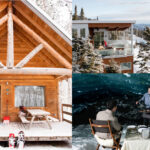
Former magazine publisher and Ditrani model Paul Green (left), an 11-month pregnant, Ontario advertising rep Tina McConachie, managing editor Iain (who once thought Snik actually contained sunscreen) and editor Cathy Carl in her big-shouldered, Princess Di pink onesie, circa 1989.
Paul Green
1947 – 2024
Paul once shocked a Maclean Hunter office of 50 co-workers when he and Mari Lise waltzed into work with baby Spencer. Not a single co-worker had known that they were expecting. Last week, the always private Paul, surprised and shocked us all when we learnt, too late to say goodbye, that his well-hidden liver cancer had quietly finished such an important chapter in the magazine and ski industries. But we all know he’s waiting for us at après ski in the sky.
First published in the DEC 2022 / JAN 2023 issue
Paul the prophet
I can’t imagine there are a lot of people who’ve been in the ski industry as long as Paul Green—long-time publisher and owner of Ski Canada—who still have intact ACLs. We trade in two fun, sometimes hazardous, industries here.
The ink dried a few months ago on the sale of this, one of the world’s longest continuously published ski magazines. In classic style, our fearless leader Paul has quietly traded in his ski gear for golf clubs. Long-time art director Norm Lourenco is now sitting on the publisher’s throne, holding the magazine’s mace.
Although I’ve been here for almost three decades, Paul has more than 10 years on me. He joined the magazine as an advertising sales rep in the ’70s.
As a very green managing editor in the late ’80s, I joined Paul in the wackiest office in which I’ve ever worked. Corporate publisher Maclean Hunter’s “Special Interest Publications” division consisted of all sorts of not terribly serious magazines. It was a nuthouse that made the gang at WKRP in Cincinnati seem boring.
Paul and I had a melancholic lunch the other day with recently retired managing editor Anne Slade, laughing about the days when magazines, Ski Canada included, employed a cast of thousands funded mostly by ads for cigarettes and alcohol.
Rogers Publishing bought Maclean Hunter in 1994 and began killing more than 100 titles in Canada and Britain. Fortunately, Paul had bought Ski Canada in 1990.
Whether because he was a visionary or just thrifty, one of Paul’s first business decisions was to have everyone work from home. It seemed impossible at the time: running a magazine with no bricks and mortar, no receptionist taking calls, no art department holding scalpels over enormous tables, no office managers or production people, not even the whoevers that served no obvious purpose.
When I settled into my home office in 1994 there was no information highway. I remember attending a lecture at the Canadian Society of Magazine Editors about a new computer tool called the Internet and leaving an hour and a half later thoroughly confused. It had only been a few years earlier that we were fighting over who got the electric typewriter instead of the manual, while a full-time fax and telex operator worked in the basement.
With staff in B.C., Ontario and Quebec, we spent decades smiling at people’s reactions when they heard we worked from home. “How do you get anything done?” Yet, here we were putting out a magazine with about a third of the staff that had been required when we were at a “proper” office.
It’s fascinating how short-sighted CEOs have been over the years. Paul and I have both enjoyed watching the naysayers squirm when the pandemic forced Forbes-level executives to allow WFH rules. Reed Hastings, president of Netflix, referred to the Ski Canada team concept as “a pure negative.”
In a New York Post interview, Malcolm Gladwell asked, “If you’re just sitting in your pajamas in your bedroom, is that the work life you want to live?” As I write this from my “lie-down desk” with 25kg of Labrador on me, I’m wondering, would I be more productive in an office tower cubicle wearing my elevator pass and listening to water cooler blather or getting distracted by a 25-year-old me playing practical jokes? Maybe Gladwell just needs new jammies.
J.P. Morgan CEO Jamie Dimon told clients that remote work “slows down honesty and decision making and doesn’t work for spontaneous stuff.” Paul agrees that leaders who lack confidence feel powerless when people work from home—they just miss feeling they’re in control.
Meanwhile, there was forward-thinking Paul with his little ol’ Ski Canada, not just surviving but thriving over the decades while the competition came and went. Paul leaves Ski Canada at a time when the average age of skiers has crept up. The ski industry has noticed those older skiers continue to not only like reading paper, but also have more time and money for travel and gear. All good things for a well-run magazine, but Paul could have told you that.




